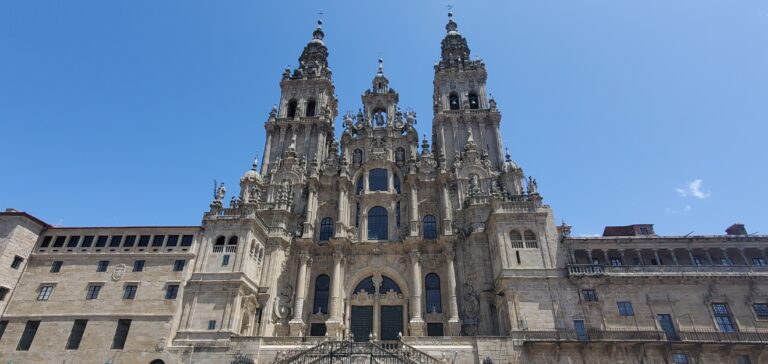Devotional Day 27
Therefore be patient, brothers and sisters, until the coming of the Lord. The farmer waits for precious produce of the soil, being patient about it, until it gets the early and late rains. You too be patient, strengthen your hearts, for the coming of the Lord is near. Do not complain, brothers and sisters, against one another, so that you may not be judged; behold, the Judge is standing right at the door. As an example, brothers and sisters, of suffering and patience, take the prophets who spoke in the name of the Lord.
James 5: 7-10
“waits for the precious produce”
Waiting is not always easy. Depending on our outlook, our mindset, it can be a time of anticipation—looking forward to something, or a time of worry—wondering if the “produce” (anything we try to produce) will ever come. Even when it does come, we wait to see if it will be sufficient, good enough.
These words come right after James recognizes the oppression and persecution many believers were facing. For them, waiting was twofold: waiting for the bad to end and the good to come. Using James’ analogy of a farmer, half the struggle of waiting for the harvest for a subsistence farmer in poverty is the hunger in the here and now. I can imagine the careful rationing, unsure exactly when this year’s harvest will come. Will the remaining rice and beans be enough to feed my family until harvest time? What if the rains come late this year? Oh, how tempting it might be to dig up those root vegetables, when unable to see from above if they have grown to their full size.
This produce is indeed precious to many—it is a source of physical life. Many living in a developed world, where food is always available in the local supermarket, don’t always see the profound nature of this kind of waiting. We get impatient just waiting in line at the supermarket, or waiting when stuck in traffic. Those short waits are also good opportunities to practice the discipline of patience—focusing on reasons to be grateful rather than reasons to worry. Ruminating on all the potential consequences of arriving late will not speed up traffic (I’ve tested the technique… it doesn’t work).
But patience in the waiting for what is deeply precious is more than a lack of anxious ruminations. It is looking forward to what is to come in faith that it will indeed come, based on the promises we’ve been given. Waiting is holding on to hope. As long as we align ourselves with God’s will, we are assured that His will will be fulfilled, often beyond our expectations. We can look forward to the end of the pre-harvest hunger—the longing for needs to be met, whether practical, emotional, relational, physical, or spiritual. There may be a longing for the relief from pain, the hope that the dark night of the soul will end and the morning sun will rise, or the desire for love to replace loneliness.
Active Waiting

This waiting is not passive. The expectant farmer plays an active role in making sure the soil is healthy, watching for obvious threats like crows or the more subtle attacks of pests. Waiting doesn’t mean sitting in an armchair and expecting all we want to land on our doorstep. We need to participate, identifying the issues attacking our hearts and minds, nurturing our relationships with God and people, asking for wisdom (remember chapter 1!) about how to proceed. It’s not just talking about it; it’s living out the Word (remember chapter 2!).
Participating in the big picture of God’s will also contributes to the anticipation that something will come of the small role we hold. There is hope that all we do is not in vain, whether or not we witness immediate outcomes. A decade ago, I went through a season of not knowing what was next in my life and work, having just finished a year in Kenya. Where was I supposed to live? How was I supposed to serve God and help others? I prayed for clear direction, and got the response: “Wait on the Lord.”
During that season of waiting, I was able to compile years of Scriptures, thoughts, and prayers into what became the Tree of Life program. It has now been used in seven countries and is being translated into three other languages; God is surpassing all my expectations. That season of waiting also put me in the position I needed to be in to care for someone who needed it when the unexpected happened. It allowed me to go to the very location in Nigeria where I (eventually) met my husband. These outcomes where completely unpredictable, impossible for me to expect or orchestrate. Everything looks MUCH clearer in retrospect; it is in the thick of it that our faith is being stretched and steadfastness emerging (chapter 1). The sun will rise, the rain will come, the harvest will bring produce. Strengthen your hearts.
Waiting through the Difficult Times
Along El Camino, we actively “waited” for the end of certain segments when climbing those steep hills or walking sections unpleasantly shared with cars whizzing past us as the sun beat down on us. Sometimes we had a vague estimate of how long such an uncomfortable stretch would last, such as hearing that two thirds of the day’s walk would be uphill. But we didn’t have an exact measure of how far we’d walked or what was left. Occasionally the incline would level out, bringing hope we’d reached the day’s peak, only to find that around the corner another ascent began.
Other times I found myself semi-intentionally underestimating the distance we’d already covered or expecting a greater challenge around the bend than we actually encountered. I prefer to be pleasantly surprised when reaching the shady trees or the summit earlier than expected, rather than disappointed when realizing we hadn’t gone as far as we’d hoped.
Sometimes expectations came from the accounts of other travelers or descriptions in a book. Knowing that challenges lay ahead helped me to be mentally prepared. In the same way, knowing that life struggles will be encountered can help us nurture resilience ahead of time. We can, to some degree, prepare ourselves for inevitable challenges. But we must be careful that it does not slip into continual anxiety or pessimism about what lies ahead, or what will happen when we turn the next corner.
When walking through less pleasant segments of the pilgrimage, I had the comfort of knowing they were temporary. We would indeed reach a place of rest and relief that day, and ultimately that final destination. Focusing on both short-term and long-term sources of hope, rather than the heat, the tiredness, or the sore feet, made the journey easier. Looking around for the small, positive things–the beautiful tiny flowers, the solidarity found with other pilgrims, and the awareness that our sore muscles were becoming stronger also made a difference.
Where do you place your attention when waiting? Focus on both immediate sources of joy—including the little things that are reasons to give thanks, and the ultimate hope of everlasting life.
“Do not complain…against one another”
Sandwiched between the recognition of suffering and examples of endurance is another exhortation to avoid speaking badly about each other. Within just six verses, James addresses “brothers and sisters” four times, emphasizing the familial nature of the churches. Like any family, good communication is crucial, speaking to one another, not negatively about one another, not against one another. Gossip and criticism behind someone’s back is incredibly hurtful and divisive, the last thing wanted in times of suffering. Yet when we’re struggling with external circumstances, we often lash out at those closest to us, putting strain on the family and the community.
James immediately follows this warning against judgmentalism with the prophets as an example of both suffering and patience. Many prophets spoke pretty harshly against other kingdoms, but also criticized fellow Israelites, their own “family.” But because they “spoke in the name of the Lord,” they served as representatives of the ultimate Judge, rather than being complainers or gossipers. Indeed, some of the worst treatment they received was from their own people. Yet they remained faithful in declaring both promises and warnings out of love, despite the opposition they encountered.
Often it is the speakers of uncomfortable truths who get attacked within the church. We get defensive when our own sins are brought to light; then we start complaining. Of course not everyone who calls themselves a prophet should be accepted; not every Bible-thumping warning of hell can be assumed as true. We have to prayerfully assess whether the words are from God, or from a fiery tongue good at igniting division instead of expressing love.
Waiting Like the Prophets
The prophets we read in the Old Testament were sent by God into very uncomfortable situations, and often had to wait a long time for their prophecies to be fulfilled. In the interim, many were bullied, rejected, imprisoned. They waited patiently for the people to repent. They waited, perhaps dreaded, for warnings of wrath to be fulfilled. After exile, they waited for liberation. They waited for the Messiah. Many saw some of their prophecies fulfilled, but none were present at the coming of Christ. Yet they held on to that promise, that source of hope, and remained faithful in hearing God and obeying His calling.
Likewise, we may or may not be around at the second coming of Christ, but in the interim we can grow in our intimacy with Him, receiving His love and following His invitation and commandment to share it with others. Under the new covenant we don’t have to wait for select prophets to hear from God. Instead, we are the ones to step into the role of listening and obeying, even when we don’t see immediate results, even when we encounter suffering. And in the midst of our waiting, we need to be showing love to one another, encouraging each other. Rather than speaking against one another to put others down and elevate ourselves, we need to be in the relationships where we can trust each other enough to offer mutual accountability, not ignoring sin but addressing it with grace.
Unhelpful Complaining
Among the numerous pilgrims we interacted with along the Way, occasionally there were a few that made me feel like complaining. In most albergues, “lights out” was at 10 pm, many being up by 6 am and out the door before 7. While the vast majority of sojourners made an effort to be quiet in the dorms, whether on the night side or early in the morning, there were a few who seemed to be completely oblivious upon entry one night that everyone was in bed, many already asleep. It seemed they didn’t know how to whisper in their Eastern European tongue (I wasn’t sure exactly what language it was). I was annoyed.
I confess, the next day I complained to my husband; we commiserated that they had kept us awake, drawing conclusions about their thoughtless nature. But doing so didn’t do anything beneficial to anyone. We didn’t know them and hadn’t heard their stories, leaving little space for empathy.
What (minimal) “suffering” we endured was not intentionally provoked, and if all my behavior over the course of the pilgrimage was scrutinized, I’m sure there would’ve been occasions when I fell short in being fully aware and considerate of all the needs of those around me. Those are the moments of discomfort that really are opportunities to practice patience, to freely give grace. Complaining is beneficial to no one. Patience is a discipline, a place to practice focusing on showing love.
Showing Patience and Love
There were also numerous interactions with people who had belief systems different from ours. I can only imagine how negative the experience would’ve been if we had focused on (or complained about) all the points of disagreement. Instead, we found solidarity and community in what we had in common. It was the mutual support that at times opened the conversation to our differences in experience and perspective, but I appreciated that the tone was never putting each other down.
I would love to see the Body of Christ function in a similar way. If we seek to understand one another, we can find empathy and create deeper relationships. We can learn from each other and love better. God can use our testimonies, especially of seeing His hand at work in times of suffering, to influence others, but it is His responsibility to change hearts and minds, not ours. We must wait patiently to see the lives of others changed, trusting God to do the work, and participating by showing His love.
Prayer
Thank You, Lord, that we can trust Your faithfulness in the midst of uncertainties and challenges. Help us to wait patiently through the challenges, holding on the hope we have in You, and supporting one another. Show us how to remain actively engaged, participating in Your will, but fully surrendered, leaving the burden of responsibility in Your hands.
Reflective Response
- Think about a time in your life of waiting. What were helpful/unhelpful ways of dealing with uncertainties? What were the outcomes?
- How do we develop patience in difficult circumstances? Patience with people? Patience with God?
- Spend time listening to Jesus, asking what He wants you to know. Practice patiently waiting to hear from Him.
Would you like to be notified about future posts? Subscribe here!





